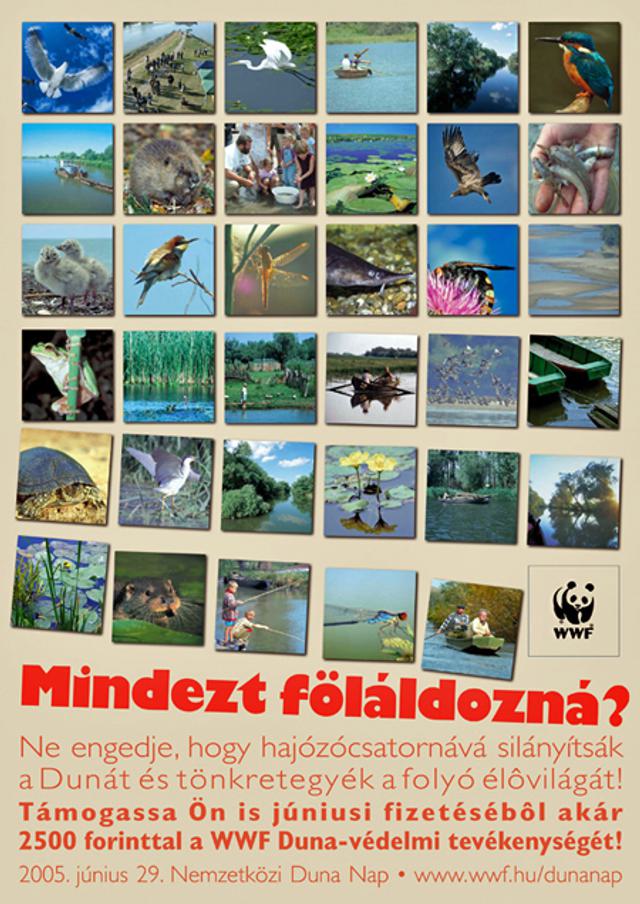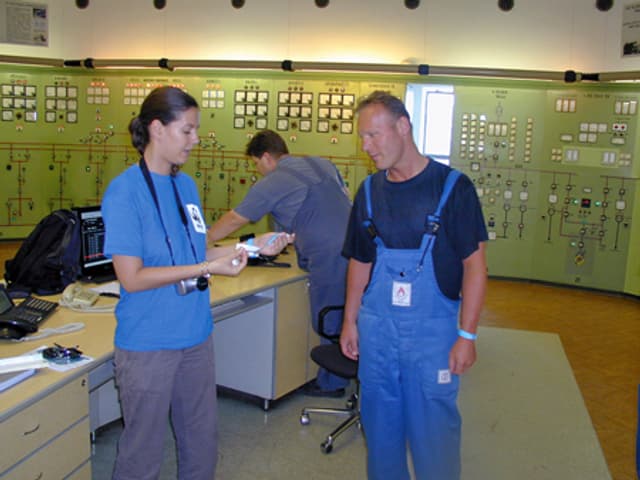WWF Hungary: ‘Don’t let Danube’s wildlife be destroyed’ campaign
- Exhibited by
- CSDF Hungary
- Added
- August 30, 2009
- Medium of Communication
- Direct mail, online, posters.
- Target Audience
- Individuals, single gift, corporations.
- Type of Charity
- Environmental/animals.
- Country of Origin
- Hungary.
- Date of first appearance
- June, 2005.
SOFII’s view
WWF Hungary persuaded several chief executives of companies they were already working with to help them to meet their employees so that WWF could tell them of the threats to the Danube, and to raise the money needed to protect the river. Extra income was raised and several hundred new donors were recruited, who hopefully will continue their support.
Creator / originator
Roland Csaki, communications and marketing director
Summary / objectives
WWF Hungary works to conserve and protect endangered species as well as to address global threats to the environment.The ‘Don’t let the Danube’s wildlife be destroyed’ campaign aimed to collect donations for the protection of the Danube River, from the employees of WWF’s partner companies.
WWF Hungary targeted 11,791 employees from the 16 companies that made up its Corporate Club. These companies were current supporters of WWF Hungary, who had been involved for a period of two to four years. In addition, 500 existing members of WWF Hungary’s Panda Club were contacted.
Background
The campaign day was the 29th of June 2005, to coincide with the second International Danube Day organised by the International Commission for the Protection of the Danube River. The main campaign objectives were to:
- Raise 5,000 euros for WWF Hungary’s Green Danube project.
- Try out individual giving from corporate links as a new fundraising technique, which was untested in Hungary.
- Build up WWF’s contact list of individual donors.
- Draw the attention of the Hungarian people to the Danube.
WWF Hungary prepared for the campaign by developing a clear strategy, defining target groups, message, channels, communication tools, events, partners, deadlines and a budget.
It contacted all 16 Corporate Club directors to ask for cooperation; 10 agreed to join the initiative. They agreed to morally support the campaign, distribute WWF’s message among employees (using posters, printed direct marketing materials and HTML email), and to make it possible for WWF Hungary staff to meet employees personally on the 29th of June to ask for their donation. They also agreed to deduct and transfer employee donations to WWF Hungary.
On behalf of the campaign, e-mails were sent from the actual addresses of the CEOs of the relevant companies. They also signed the letters that were sent to WWF Hungary’s members
Small events were organised at each participating company on International Danube Day, where WWF Hungary staff or volunteers met the employees and told them about the environmental problems threatening the Danube and asked them for financial support.
Once the campaign day was over, donations were collected and the campaign was evaluated. A personal thank-you letter was sent to the directors of all the participating companies in the name of WWF Hungary’s CEO, and all donors received personal thank-you letters with information on the success of the campaign.
Special characteristics
This campaign was a good test of individual giving from current corporate sponsors.
Influence / impact
WWF Hungary managed to get the attention of around 10,000 people to the threats to the Danube, and reinforced their relationship with corporate partners.
Results
The campaign generated 3,800 eurs, 400 new private donors’ personal details were collected for future fundraising action, and the ROI was 0,95.
In addition, WWF Hungary gained valuable experience in this fundraising technique and set a model that can be easily adapted by other NGOs.
Merits
WWF Hungary was successful in engaging its partner companies at CEO-management level. They successfully used a combination of online and offline PR activities, and set a precedent for this type of fundraising technique.
Other relevant information
Adapted from CSDF’s 2006 publication Mission Possible.
 View original image
View original image
 View original image
View original image
Also in Categories
Tags
- Hungary

















